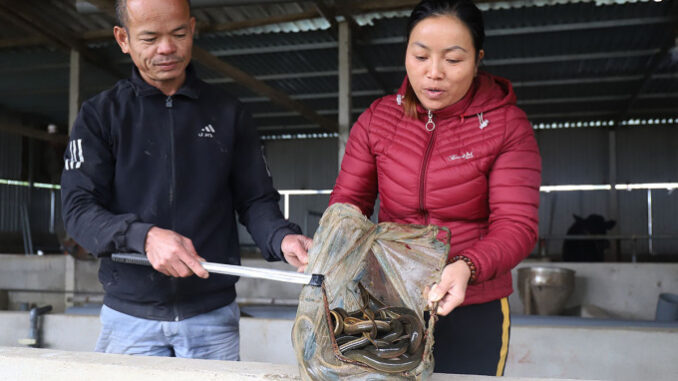
HA TINH – Seeing Mr. Tran Van Ha and Ms. Do Thi Thanh Thuy buy small field eels to raise for sale, many people think that “this family is crazy”.
At the end of the year, standing next to a newly built flat roof house worth more than 1.5 billion VND in Thach Lien commune, Thach Ha district, Mr. Ha (46 years old) and Ms. Thuy (45 years old) said: “This Tet, the family is warm. already”.
From a ruined land of 2,000 m2, thanks to their predestined relationship with the field of eel farming, the couple created a spacious property with a system of houses and a closed garden, pond, and barn.
Married in 2015, Mr. Ha and Ms. Thuy moved out to live separately with the accumulated amount of several tens of millions of dong, two acres of field, and the land left by her husband’s parents. Previously, Mr. Ha had cherished the intention of building a cement tank to catch field eels to raise, then export the seed to sell to the people, but because of many problems, he could not do it. A few months after the wedding, when she heard her husband discuss the unfinished plan, Thuy nodded: “I support it”.
With available land, the couple borrowed more than 100 million VND from friends and relatives to build 24 tanks, each 4 m wide. At first, the two people went to the fields to graze bamboo tubes, catch themselves or buy seeds from farmers practicing eel hunting to bring back for trial farming. “At that time, many people said that my husband and I were crazy if we could make them go to the ground,” Ms. Thuy said.

Mr. Ha spent 50 million VND to buy more than 5 quintals of dong eels to release. In addition, he also bought another 60 kg of artificial seed for 21 million VND from the North to raise to compare the behavior of these two types. In the first crop, field eels grew after many months of care, but every day they died with about half a kilogram; artificial eel alone is not raised forever. Ms. Thuy then opened the manhole cover to release more than 60 kg of artificial eels into the river, collecting dead field eels to clean the environment.
“I continued to be called crazy by my neighbors because I bought eels to go home,” said Ms. Thuy. The first case was considered abandoned, the couple lay awake many nights, thinking about eels in their dreams. “I certainly don’t know how to raise them,” Thuy told Mr. Ha. The two then spent time online to find out, one thing that the water in the tank currently does not have enough pH.
At first, the tanks brought water from the well in the field. Mr. Ha analyzed, this water does not have alum, lack of pH causes eels to die. Available in the garden with a pond 200 m wide, 1.5 m deep, Mr. Ha bought a pipe, pumped water from the river about 500 m away from his house to store it in the pond. He poured this water into the tank twice a day. . The rearing crops after eel are less dead and develop well.
In addition, thanks to diligently studying information online, Ha now knows how to prevent fungal diseases for eels, that is, he has to pour salt water mixed with water into the tank every week, disinfecting the water source.

In the first two years, the loss was about 400 million VND because the eels died and the consumption market was not secure, sometimes Mr. Ha expressed his frustration, Ms. Thuy sat beside him and said: “Doing good and sometimes losing. Failure is normal if you win. After all, where is the money spent?” Hearing his wife say that Ha immediately added the sentence “are you crazy”. When Thuy heard that, she smiled. Seeing his wife optimistic and supportive, he said “it’s okay, we have to follow to the end”.
The establishment at Ms. Thuy’s house is mainly pure field eels, sold twice a year. At the beginning of the year, Ms. Thuy will spend a month collecting about 3 quintals of eels to raise in 24 tanks. After 3-4 months, when the eels develop, they are sold to hatcheries in the North or in Hue for them to continue taking care of. Out of a litter, she went to collect new litter. In November-December, she will stop taming small eels, because it’s cold, they won’t eat, they’ll easily die.
Small field eels about 150 each kg, cost 100,000 VND. By the time of sale, there were about 130 fish left per kg, priced at 450,000 VND, earning more than 300,000 VND per kg. If the eel seed is not sold out, the family will raise it commercially. After 7-8 months, Ms. Thuy sold it to restaurants in the province, priced at 150,000 to 200,000 VND per kilogram.
Ms. Thuy shared that field eels have a beautiful yellow color, delicious meat, and high nutritional value, so they are popular with many establishments. In the first two years, having difficulty in connecting the output, Ms. Thuy went online to find the address and contact the breeding facilities. They then sent someone directly to Ms. Thuy’s house to survey and ask questions about long-term cooperation. From the third year onwards, the family starts to make a profit. On average, a year the couple earns about half a billion dong from selling eel seed and meat, the debt due to the old loss has been paid off. From 2020 to now, due to Covid-19, it is difficult to travel, so she does not dare to eat large quantities of eels even though the orders are always large.

Thuy and her husband have two sons, 3 and 4 years old. Recently, after many years of accumulation, in addition to building a house, the family also built a number of barns to raise dozens of breeding cows for fattening and selling for profit.
Mr. Duong Kim Hong, Chairman of Thach Ha District Farmers’ Association, assessed that Mr. Ha and Ms. Thuy are hardworking, enterprising farmers who know how to apply new techniques in livestock production for economic development.
“Mr. Ha and his wife were the first people in the district to domesticate field eels. This model was later followed by a few people, but most of them followed it for a short time and then quit. As for Mr. Ha’s family, it was successful thanks to this method. Be persistent and creative,” said Mr. Hong. Follow (vnexpress)
